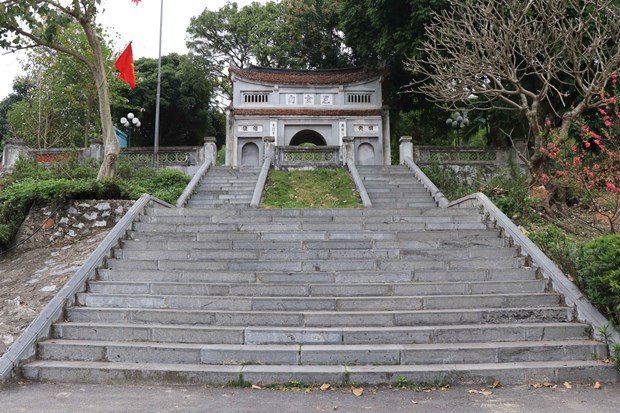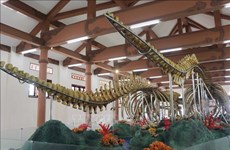Gia Binh – potential tourist destination in Bac Ninh province
 The Le Van Thinh Temple in Gia Binh district, Bac Ninh province (Photo: VNA)
The Le Van Thinh Temple in Gia Binh district, Bac Ninh province (Photo: VNA)Bac Ninh (VNA) – Gia Binh district in
the Red River Delta province of Bac Ninh has great potential to become a
tourist destination given its beautiful natural scenery, rich cultural heritage
and numerous traditional craft villages.
However, in order to “awake” the potential, a good investment policy for the tourism sector is
needed.
Rich cultural heritage
Gia Binh is home to 72 historical and cultural relic sites, 10 of which are at
national level and 62 at provincial level. Some outstanding sites are the
temple dedicated to Le Van Thinh – ranking first in the first imperial examination of the Ly
Dynasty and later becoming a top mandarin, Thien Thu pagoda, Bao Thap temple, and Dai Bi
pagoda.
The
relic sites are located across many villages, attracting thousands of visitors
from all corners of the country.
Gia Binh administration has always paid attention to conserving and repairing
historical and cultural relics. This year, the district has a plan to conduct
maintenance of seven relic sites, which are Gia Phu temple (Binh Duong
commune), Lap Ai temple (Song Giang commune), Cao Tho and Chinh Thuong communal houses (Van Ninh commune), Cuu Son communal house
(Dong Cuu commune), and Cam Xa communal house and Ngu temple (Nhan Thang
commune).
The
district also boasts beautiful natural landscape with peaceful countryside
scenery, which is suitable for rural tourism, eco-tourism and relaxation
tourism. Some big corporations, such as the TH Group, is eyeing investment in tourism
in Gia Binh.
Besides,
Gia Binh hopes to capitalize on the local Ca tru singing heritage and its
famous traditional craft villages, like the Dai Bai bronze casting village,
Xuan Lai bamboo weaving village, Ngam Luong silkworm raising and silk weaving
village, to name just a few. The district is working towards developing local
traditional products to serve tourism.
Future of Gia Binh tourism
Gia Binh
administration has build a project on developing eco and spiritual tourism in
2020-2030 and called for investment under the project, which is hoped to
contribute to preserving the local eco-environment, especially agricultural
ecology in the context of fast urbanisation.
Under the project, the restructuring of local crop structure will be
accelerated towards hi-tech and clean agriculture, serving as a basis to create
more jobs and raise incomes for locals.
The project maps out a series of solutions in terms of planning, investment,
promotion, development of different types of services, cultural heritage
preservation, environmental protection, human resources training and State management
capacity building.
In the immediate future, Gia Binh will focus on making and approving detailed
plans for tourism sites and zones, building programmes for craft village
development in connection with historical relic sites, conserving and
renovating relics and developing some typical traditional festivals.
Nguyen Hong Phuc, head of the district’s Culture and Information Section,
revealed that several potential investors have made surveys with the intention
of making investment in tourism in the district. One of them is the TH Group
with a plan named “Legendary River” which eyes clean and hi-tech agriculture
linked with eco-tourism and spiritual tourism. This is an encouraging sign for
Gia Binh’s tourism.
At the same time, the district is taking the initiative in undertaking
strategic solutions so as to create a breakthrough development in tourism and
fully tap local potential. It will accelerate work to early complete a
cultural-eco-spiritual tourism complex beside the Duong River, publish revised
versions of pamphlets on local cultural and historical sites, attract investment
in the Nguyet Ban and Duong River tourism sites, and build a stop-over on National
Highway 17 near Dai Bai bronze casting village and Xuan Lai bamboo weaving
village to stimulate tourism in the area.
Gia Binh has an
ambition of developing a waterway tourism route on the Duong River starting
from Kinh Duong Vuong tomb to Cao Lo Vuong Temple, bringing visitors to sites
along the river such as Xuan Lai bamboo weaving
village, Dai Bai bronze casting village, Le Chi Vien Temple, Huyen Quang
Temple, Le Van Thinh Temple and Thien Thai mountain. The route would also be
connected with Bac Ninh province’s project on tourist boat development./.












